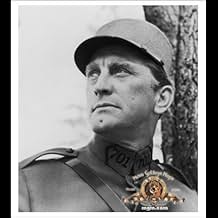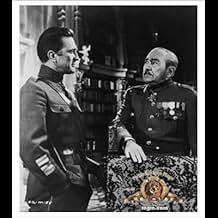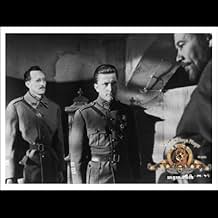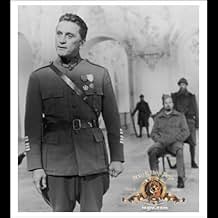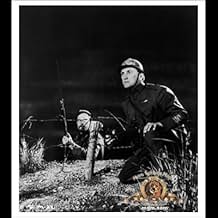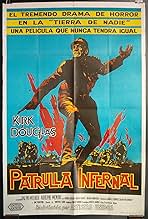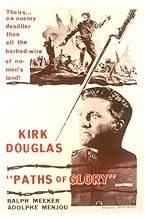Depois de se recusar a atacar uma posição inimiga, um general acusa os soldados da covardia e seu comandante deve defendê-los.Depois de se recusar a atacar uma posição inimiga, um general acusa os soldados da covardia e seu comandante deve defendê-los.Depois de se recusar a atacar uma posição inimiga, um general acusa os soldados da covardia e seu comandante deve defendê-los.
- Direção
- Roteiristas
- Artistas
- Indicado para 1 prêmio BAFTA
- 5 vitórias e 3 indicações no total
- Pvt. Pierre Arnaud
- (as Joseph Turkel)
- German Singer
- (as Susanne Christian)
- Capt. Sancy
- (não creditado)
Resumo
Avaliações em destaque
Winston Churchill famously claimed that it was this movie that was closest to evoking the atmosphere of WW1 and the military mind. And you know what, he is right. For one thing, Paths of Glory is gorgeously filmed, with relentlessly beautiful cinematography and nice costumes and scenery. The screenplay is sometimes humorous, sometimes moving and sometimes even haunting, either way it was some fine writing. The efficiency of Kubrick's direction is proof of a great man at work.
The performances were superb. As the general who orders the hopeless attack on the German position, Adolphe Menjou's character is perceived as a villain not because of being an officer adhering to the letter, but that he is seen as "the arrogant aristocrat" because of his fear of the working classes than his hatred of the enemy. Among the cast, Timothy Carey and Kirk Douglas especially were outstanding. And the music? That is one rousing score I can tell you. Great movie. 10/10 Bethany Cox
The setting is the Western Front of 1916 in the trenches with French soldiers faced off against an invisible German force across a barren No Man's Land. The German's are never seen and the dramatic "combat" is between vain French officers as they vie for prestige and honors. The victims are the innocent French soldiers under their command who suffer miserably because of their arrogance and ignorance.
Brilliant, gripping, and definitely a "must see".
As powerful a film as ever existed against those who pursue war as a solution, painting a portrait of the incompetence of command and the futility of armed conflict, as French soldiers on the front during WW1 discover the penalty for disobedience, the consequence of insubordination and that everyone is accountable, and that nothing's fair, there is no love in war.
Top performances all round, especially from Kirk Douglas, and a director that went on to make his mark quite significantly in the world of film.
In contrast to his previous picture, The Killing, a definite Kubrick style is beginning to emerge now. One notable example is the scene in which General Mireau tours the trenches, walking towards the audience with the camera retreating away from him. This technique would be repeated years later in Kubrick's other war film, Full Metal Jacket. There is also something about the arrangement of objects in the frame, as well the tracking and dollying which hints towards his more familiar later style. His recurring chess motif appears as well, albeit subtly. At the court martial the floor is chequered, and the soldiers on trial are seated with guards standing behind them as if they are pawns about to be sacrificed.
The light and contrast in this picture is put to good effect. The palatial officers' headquarters is light and airy with few shadows. The trenches are gloomy and cramped. Kubrick was becoming a real master at contrasting locations and getting the look of a place just right.
The use of music in Paths of Glory is bold and brilliant. The pre-recorded score is almost entirely percussive all rhythmic sounds with no melody. A weird kettle drum track is used to help build tension in the night patrol scene, while in the climactic scene the funeral march drumming instills a sense of dread, further heightened by having the shots edited in time to the beat. In the emotional final scene we get the complete opposite a beautiful vocal melody. This has all the more impact after hearing nothing but militaristic drums for the rest of the film.
The casting is absolutely flawless. While there are no big names apart from leading man Kirk Douglas and the now elderly Adolphe Menjou, there isn't a single weak performance. The despair and resentment of the condemned soldiers feels so absolutely real. In contrast the smugness and fake sympathy of the upper class officers is brilliantly portrayed.
Throughout his career Kubrick never seemed to be particularly keen on blatantly emotional moments. Paths of Glory is the exception. The later scenes are incredibly poignant and moving, and the final moments in the soldier's bar are what makes it a masterpiece more than anything else the icing on the cake. However it's quite probable that Kubrick regretted this as an overly sentimental approach, as woolly sentimentalism was a major gripe of his when he worked on Spartacus. Whatever the case, he certainly reined in the stirring stuff considerably after this, to the point where his later films became characterised by their understatement of emotions.
Você sabia?
- CuriosidadesBanned in Spain under Gen. Francisco Franco's dictatorship for its anti-military message. It wasn't released until 1986, 11 years after Franco's death.
- Erros de gravaçãoCol. Dax commits a glaring military faux pas by jamming his hands into his pants pockets while standing and walking in the courtroom during the trial. No military officer would do such a thing, particularly in such a formal setting as a court martial.
- Citações
Pvt. Pierre Arnaud: I'm not afraid of dying tomorrow, only of getting killed.
soldier in bunk: That's as clear as mud.
Pvt. Pierre Arnaud: Well, which would you rather be done in by: a bayonet or a machine gun?
soldier in bunk: Oh, a machine gun, naturally.
Pvt. Pierre Arnaud: Naturally, that's just my point. They're both pieces of steel ripping into your guts, only the machine gun is quicker, cleaner, and less painful, isn't it?
soldier in bunk: Yeah, but what does that prove?
Pvt. Pierre Arnaud: That proves that most of us are more afraid of getting hurt than of getting killed. Look at Bernard. He panics when it comes to gas. Gas doesn't bother me a bit. He's seen photos of gas cases. Doesn't mean anything to me. But I'll tell you something though, I'd hate like the devil to be without my tin hat. But on the other hand I don't mind not having a tin hat for my tail. Why is that?
soldier in bunk: You're darn tootin', because...
Pvt. Pierre Arnaud: Because I know a wound to the head would hurt much more than one to the tail. The tail is just meat but the head- ah, the head is all bone.
soldier in bunk: That's...
Pvt. Pierre Arnaud: Tell me this. Aside from the bayonet, what are you most afraid of?
soldier in bunk: High explosives.
Pvt. Pierre Arnaud: Exactly, and it's the same with me, because, because I know that it can chew you up worse than anything else. Look, just like I'm trying to tell you, if you're really afraid of dying you'd be living in a funk all the rest of your life because you know you've got to go someday, anyday. And besides...
soldier in bunk: Yes?
Pvt. Pierre Arnaud: If it's death that you're really afraid of why should you care about what it is that kills you?
soldier in bunk: Oh, you're too smart for me, Professor. All I know is, nobody wants to die.
- Versões alternativasThe Criterion DVD version features the opening and closing MGM logos.
- ConexõesEdited into Hai-Kubrick (1999)
- Trilhas sonorasLa Marseillaise
(1792) (uncredited)
Written by Claude Joseph Rouget de Lisle
In the score during the opening credits
Principais escolhas
- How long is Paths of Glory?Fornecido pela Alexa
Detalhes
- Data de lançamento
- País de origem
- Idiomas
- Também conhecido como
- Patrulla infernal
- Locações de filme
- Schloß Schleißheim, Oberschleißheim, Bavaria, Alemanha(Command Headquarter)
- Empresa de produção
- Consulte mais créditos da empresa na IMDbPro
Bilheteria
- Orçamento
- US$ 935.000 (estimativa)
- Faturamento bruto mundial
- US$ 8.290
- Tempo de duração1 hora 28 minutos
- Cor
- Mixagem de som
- Proporção
- 1.66 : 1






